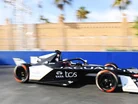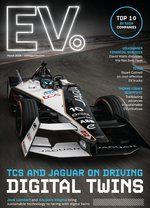TCS and the Jaguar TCS Racing Team on Driving Digital Twins

In manufacturing, problem solving is a top skill, but identifying a problem before it hits is an even greater talent. A digital twin is a virtual representation of a physical process throughout its anticipated lifecycle, in order to identify potential future issues. This concept was first hatched by Dr Michael Grieves, a researcher at the University of Michigan, in 2002.
Two decades later, digital twins play a vital role in constructing smart cities, building tools for aerospace and manufacturing equipment. By leveraging digital twins, manufacturers can quickly spot problems, enhance efficiency, reduce costs and advance electric vehicle technology.
Driving success through digital twins at Tata Consultancy Services
Tata Consultancy Services (TCS) is a global IT services, consulting and business solutions company, with more than 600,000 employees worldwide. For more than 50 years, TCS has partnered with some of the world’s biggest brands to facilitate their growth and digital transformation journeys, doing everything from delivering cloud migration and security, using AI to improve customer service and implementing machine learning to manage risk.
Anupam Singhal is the President of Manufacturing at TCS and leads TCS’ manufacturing business globally, committing to customer success by driving digital transformation and formulating effective business strategies.
“TCS is an early innovator in building digital twin capabilities across a range of use-cases and industries. From strategic decision-making platforms to fully modelled digital human organs, TCS’ digital twins are as diverse as they are valuable to our global customers,” says Singhal. “In manufacturing, TCS has leveraged digital twins for several years, applying the technology to optimise plant performance as well as reduce unplanned outages.”
Singhal sees digital twins as fundamental for race preparation and strategy for Jaguar TCS Racing. Digital twins are deployed for the development, optimisation and running of the Jaguar I-TYPE 6 race car, which allows the racing team to move beyond limitations of the physical domain and accelerate their learnings.
“The team’s primary digital twin is a driver-in-the-loop simulator, which is used across all areas of technology — from powertrain software development to race engineering and driver preparation,” he continues. “Cloud computing and rapid access to data help Jaguar TCS Racing realise the full benefits of digital twin technology. That’s why TCS built a cloud environment for the team’s database and software. The cloud environment gives the engineers at the track and the team base timely access to the same data, whether generated by the car or its digital twin.”
For more than a decade, TCS has leveraged innovative technology to help Jaguar Land Rover accelerate their electrification journey.
“Today, TCS uses technology to help Jaguar TCS Racing win races. Technologies being developed and tested at the Formula E racetrack will soon find their way to the consumer EV market,” Sighal adds.
Revolutionising racing through digital twins and sustainable technology
Jaguar TCS Racing is a race-winning motorsport team competing in the ABB FIA Formula E World Championship, the pinnacle of all-electric racing and the world’s first net carbon zero sport since inception.
Jack Lambert is the Research and Innovation Manager for JLR Motorsport.
“Our ambition is to not only compete for the World Championship title, but to also drive innovation, powering race-to-road technology transfer and software development, to support JLR’s all-electric road cars,” he says. “We are also committed to inspiring the next generation and creating a positive impact on our planet and in the communities in which we race.”
TCS became the Title Partner and Official Technology Partner to the JLR team in 2021, building on a longstanding relationship with JLR. TCS is committed to leveraging its leadership in digital technology to support the race team in its ambition to win races, as well as accelerating the electrification journey from race to road. The partnership moves beyond traditional sports sponsorship, by driving sustainability forward and leveraging the excitement of racing to inspire the next generation of engineers.
“Specifically, TCS leverages the power of cloud computing to create a flexible environment to host the team’s existing data analytics software,” Lambert continues. “This provides timely access to the flow of data from the racetrack to the Jaguar TCS Racing remote ops room and vice versa.”
JLR Motorsport’s primary ‘digital twin’ is a driver-in-the-loop simulator, which it has at its new facility in Oxfordshire, UK, which is used across all areas of technical activity — from powertrain software development and vehicle dynamics and control to race engineering and driver preparation.
“The simulator aims to replicate all aspects of the systems in the new Jaguar I-TYPE 6,” Lambert says. “It uses the highest level of correlation to reality; in the form of hardware when considering electrical distribution and control systems and models, or digital twins for simulation of the physics of the car on the racetrack when in motion. The driver-in-the-loop simulator allows our drivers, Mitch Evans and Nick Cassidy, and our reserve drivers to immerse themselves in the digital version of the Jaguar I-TYPE 6 on Formula E circuits in real-time. This process replicates the drivers sitting in the cockpit of the race car. The steering wheel, seat and all aspects of driver interaction, even the radio link to the race engineering team, are all replicated to be as close to reality as possible.”
JLR Motorsport also applies the concept of a digital twin to development throughout the creation and optimisation of the I-Type 6, utilising digital tool sets from the early stages of both hardware and software to facilitate fast iteration and learning.
“This ranges from modelling of components and systems through to whole vehicle testing on rigs simulating real world inputs,” says Lambert. “Each of these relies upon a digital twin of interdependent systems or components or that of an environmental input like a track or driver.”
The work JLR Motorsport does in the simulator is vital for continuous improvement, not only from session to session during a race week, but across the entire season.
He continues: “In the lead up to races, especially those that are new to the sporting calendar, we prepare by completing test laps in the virtual simulator. This allows us to get familiar with the track, without having to be physically on the ground, therefore removing the need for additional air travel.”
Being able to run digital twins helps the team to develop software, toolsets and approaches which are key to performance improvement. Lambert sees digital engineering as the foundation for technical development at Jaguar TCS Racing, which allows them to move beyond limitations of the physical domain and accelerate learning across all activities.
These systems will continue to be important for the team, especially as both digital technology and championship regulations evolve, just as they have for the Gen3 era, and the engineering challenge grows in complexity.
“Each time we make a step forward in performance, whether that be through engineered systems, operational efficiency or race management, it all has digital engineering at the foundation,” Lambert concludes. “Leveraging digital engineering and the concept of digital twins allows us to iterate designs or processes without the constraints of physical deployment, and in certain cases run these iterations in parallel.”
******
Make sure you check out the latest edition of EV Magazine and also sign up to our global conference series - Sustainability LIVE 2024
******
EV Magazine is a BizClik brand



